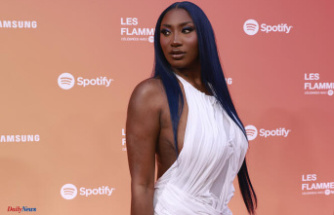Sometimes words fail you at certain moments. That's how it was for me when I read Sophie Passmann's interview in the Swiss magazine "Annabelle", my attention was then drawn to a comment from the "Süddeutsche Zeitung" and finally to the Instagram story of Sophie Passmann herself. In my head meanwhile things went wild, my heart was racing. First I asked myself why some women are so ignorant, then I asked myself whether I might still be ignorant myself and came to the conclusion that it is important to express myself on the subject and still find the right words. But before I do that, I'll try to pick up those who didn't hear the entire discussion at all or only marginally.
Sophie Passmann, influencer, author, actress, is considered a feminist. According to the definition, this roughly means: She wants to strengthen the image and self-determination of women in society. You only have to strengthen what is not yet strengthened enough in comparison, of course. And the comparative value is men. After an interview with the Swiss magazine "Annabelle", voices were recently raised that she was at best a white feminist.
There it says in a passage that has been quoted several times: "When editors make a black woman the supposed mouthpiece of racist experiences in Germany in the name of anti-racism, this means that only one standard is reproduced again: Who speaks the loudest, funkiest in "I put an interview microphone in it? Without doing anything against racism. That's why I pulled myself out of the politics shit completely two years ago. It just doesn't do anything except that I sell decent books. And that's too dishonest even for me." , she says in it, among other things.
The question asked why that wouldn't do anything. "To list an abstract grievance in an interview that is only substantiated by feelings and experiences?" replies the 28-year-old. Racism is therefore an "abstract grievance", individuals should not take others into "joint responsibility" with their statements, feelings and experiences should not be equated with facts, according to their further statements.
These were then heavily criticized: Passmann wanted women to feel empowered in society, but she did not recognize the reality of many Black women, some commentators noted. Feminism only after the privileged white reality. The big problem: It is essential for social progress to recognize racism and also in feminism to recognize that it has many facets, which also includes black women's experiences of racism. Political scientist and author Emilia Zenzile Roig aptly commented on Instagram under the SZ post: "BIPOC women are discredited and silenced, all in the name of 'feminism'. Feminism reinforces patriarchy when it is not intersectional... when within the feminist movement the most powerful women step on the others, let's see what happens: patriarchy and white supremacy are getting stronger, and yes, white women too. Don't the others count? That's the question."
But then there were also dissenting voices: Sophie Passmann meant it very differently, she wanted more black women to speak and have their say, was interpreted into it and tried to dress up what Passmann launched. A comment in the "Süddeutsche Zeitung" also says that feminism can only work if we women don't attack each other. The tenor is always: We white women explain to everyone else, including black women, how we can all grow. In truth, however, not all women and feminism and the empowerment of women cannot take place everywhere if the differences within the movement are not recognized.
I asked myself: How can it be that an intelligent woman like Sophie Passmann understands and acknowledges that women are still being disadvantaged and are fighting for change, but vice versa Black women are disadvantaged even more , doesn't particularly support them, but still has the arrogance and ignorance to want to tell them how empowerment would and could work?
According to her statements, empowerment can only work "if I set an example that I am who I am and, on this basis, try to be a little bit better than those who were before me". If you were to take her statement literally and implement it, it would mean that everyone only has an eye on themselves and develops further, which is fundamentally right and good. In the overall context, however, that would mean that the grievances will remain where they are noticeable now, if a society only rises as a whole at different levels, but not specifically where it would be necessary so that the levels become more even. Or even worse: if only the upper levels set themselves apart even further.
It would be more logical, more important and fairer to start where the levels still show great differences in height: Black women must first be strengthened so much that they come closer to the privileges of white women in a social context, so that they take place on a similar level, and then to be able to get closer to the level of "old white men" in the following, to use Passmann's language. This is the only way equality, fairness and cooperation can work. And if the 28-year-old only talks about how white women can enjoy even more privileges, she is part of the problem.
And I can judge that because I know what it's like to rest on a very comfortable position: I'm also a white woman who doesn't like the grievances in this society, the uncomfortable parts and the levels of privilege and disadvantage have significant height differences. It is certainly easier and more comfortable for us to just stand up for our own needs: I want to be able to be who I am without being pigeonholed as a woman or having to read through hostile comments. Without having to think about whether I can wear my favorite dress at night or whether it is too dangerous because some men think they have a right to be allowed to harass me. It is clear that we are committed to changing this way of thinking. Differences in salary for the same jobs, and, and, and.
But it would be presumptuous, selfish and even harmful to disregard women, who have many more problems to set aside, and to want to include them somewhere under the heading of feminism in the fulfillment of one's desires, while undermining their individual problems in the process. And that's what happens when we don't first use our own privileges to pull up the level below us. We didn't have to do much for our privileges. To draw a direct comparison: Black women are not only afraid of being followed or approached by some men on the street at night in their favorite dress. What's more, you must also be afraid of not being adequately protected by the police. In addition, they have a higher probability that men AND women from the right-wing scene can also come across as stupid - to put it harmlessly. And these are just a few reasons why black women in Germany feel particularly uncomfortable.
After following the discussion for a few days, listening to smart women like Jasmina Kuhnke or Emilia Zenzile Roig in the debate and being able to fully understand their points of view, I had to realize that they had already made everything important clear. But that it is particularly important that white women like me, who are neither among those affected nor on the side of the right-wing scene, now have to make it clear where the problem often lies and have to reflect on themselves. Especially with regard to the fact that a white SZ author takes Passmann's side and pushes the criticism of black women aside and it is once again black women themselves who are loud and have to point out how problematic the statements are.
Passmann apologized a short time later and wrote: "I'm very sorry that this passage was misleading, because that was my mistake. I'm ashamed of the ease with which I read this passage (when releasing the interview). me, it shows that I've been careless about a topic that I don't care about myself. So far I can only guess why that was the case and I'll think about it in the coming weeks. In the discussions (and sometimes also publicly) is mine After the first impression, it became clear what I actually wanted to say." That is: "I criticize the media industry for its rule, which continues to function according to an old and thus patriarchal structure, which turns individual speakers from different groups into tokens and thus washes away from real work. I could and should have said that better. It I'm really sorry, it wasn't my intention to hurt people. I did it anyway. Sorry."
But the problem with their statements and subsequent behavior remains and is the following: The division is widening again because trust is being lost and many women feel excluded from the efforts for equality, quite explicitly Black women. Because the arrogance of privileged women becomes clear again: Some steer the discussion away from the actual problem, which has to do with oneself, towards the larger, ignorant "we are all feminists and have the same concerns" excuse.
And Passmann chooses the "I'll retire and think" variant, which I hope she takes seriously and didn't just choose for self-protection. Because especially in recent years, there have been cases of people making unconsidered statements in public, hurting people, apologizing and only then wanting to learn. But you can avoid the whole thing if you listen beforehand, take others seriously and deal with them - and not only when you yourself come under criticism. This suggests that the stories have not really been taken seriously up to now.
The discussion also shows that feminism often ends where it becomes uncomfortable: when it comes to the fact that larger problems have to be cleared up first, such as the grievances of black women, so that they can get to where many white women do women already standing.
What Sophie Passmann said in the interview can therefore be better adapted to herself: It should certainly not be just one Sophie Passmann or other white women who speak particularly "funky" into the microphone and explain how holistic feminism and empowerment work. And certainly not how anti-racism works. When Passmann says that interviews with individual Black women won't help in the fight against racism, the logical consequence is that only the behavior of us privileged white people helps - right?
Well then, please: let's start listening and accepting what is being said by these same women; putting the ego aside and standing up for everyone in everyday life who may still feel uncomfortable in society because of us; to raise our voices when we realize that injustices are happening that don't directly affect us; to intervene when someone is being targeted for racist reasons; shifting our gaze from our comfortable level to levels where it is unfairly more uncomfortable. Only then do the disadvantaged really feel taken seriously, seen and actively supported.
We, as white women, would also like someone to intervene if someone comes too close to us without being asked, whom we would not be able to cope with physically. And only then could we feel comfortable in this society with the knowledge that someone would help. It is unrealistic that there will be no more people who do injustice. A helpful way to tackle this in the future is to make us all more aware of solidarity in all respects so that a stronger sense of security can develop.
You can only grow in a society together, including everyone. And especially those who are on the higher privilege level are called to act, to put it simply: Men should recognize the disadvantages of women, white people the disadvantages of black people. You can only grow if you leave your comfort zone and don't just look and strive for the next higher level, but first take those from the lower levels up with you in order to increase your overall power so that you can then reach the next level together. And in the end Passmann is probably right after all: this kind of empowerment starts with each and every individual.
Sources used: "Annabelle" / "Süddeutsche Zeitung" / Instagram












